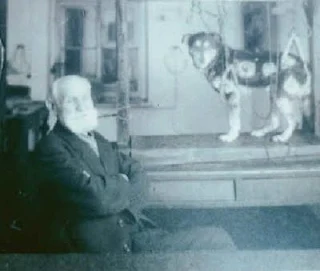The afterlife of Robert Whytt is a comparatively muted
thing. In James Buchan’s recent history of the Edinburgh Enlightenment, for
instance, he is mentioned only in passing as the Professor of the Theory of
Physic at Edinburgh’s University. Whytt does figure in more specialized histories – for instance, Kurt
Danziger devotes quite a bit of space to him in an article on the “pre-history’
of the notion of stimulated motion in animals. This is because Whytt branched
off from the physiology that was dominated by Descartes’ idea of dualism,
without adhering to the 18th century school of materialism. Danziger
has corrected the notion, floated in the nineteenth century by T.H. Huxley,
that the behavioralist school of psychology owes its rise to reducing Descartes
two forms of behavior – one actuated by reason, the other by sheer mechanics –
to the latter alone. Whytt, according to Danziger, did not want to make the
rational soul responsible for what Descartes had called mechanical motions, but
he did not want to return to Descartes’ simple dualism. Rather, Whytt wanted to
carve out a third kind of thing – a living thing:
“The necessity which, for Whytt, governed the operation of
the sentient principle, involved the preservation of the life and organic unity
of the animal body. It was impossible to predict the effects of stimuli on
organic response for mechanical, or for that matter, chemical considerations,
becauseinterposed between the stimulus and the response was the sentient
principle which ensured that the response was such as to preserve the integrity
of the living system. The old dualism had recognized only two kinds of actions
in the world: voluntary action, governed by reason, and physical action,
governed by mechanism. Whytt now argued for the existence of a third kind,
fundamentally distinct, type of actions represented by “motion from a
stimulus”. To the rational and the mechanical determinants of action there was
now added a third set of determinants
derived from the self-regulation of the living body.” (1983)
Philosophers, who are never happier
than when working the aisles of the dictionary, may be tempted to call this
vitalism. It is a large question in the philosophy of sciences whether, in
fact, the third set of determinants in Whytt’s schema can be reduced to the
second set. As well as whether the first set is not, really, an articulation of
the third set.
The
problematic concerns me mainly because it gives us a sense of the confusions
that will haunt the interpretation of “shock” as the three determinants lour in
the background, sometimes merging, sometimes distinguished one from the other.
Most commonly, collision and shock are often taken to refer exactly to the same
thing, even as, in the entangled tale of shock, the total discourse in which
the later category plays its role makes it impossible to identify shock and
collision strictly. Shock as a thing felt, a human thing, operates as a
category that traverses sociology, aesthetics and psychology, and is implicated
in the two great psychological schools of the twentieth century –
psychoanalysis and behavioralism. Both schools, of course, have lost their sway
as psychology was annexed by the pharmaceutical companies, but both beat,
still, within not only the folk psychology they so permeated, but also within a
psychological literature that refuses to die, finding its place in pockets in
academy, or outside the great neo-liberal sphere.



No comments:
Post a Comment